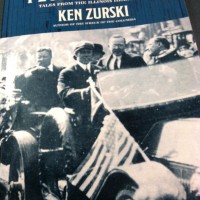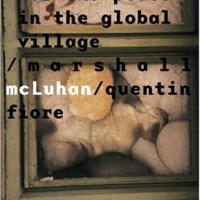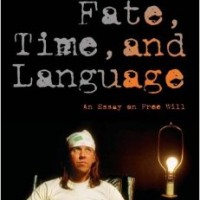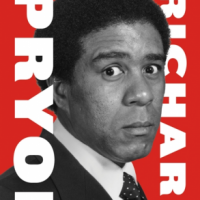The Literarea 2014 Year End Book Review
- Details
- Published on Saturday, 03 January 2015 14:38
- Written by Kevin Kizer
From classic lit to philosophy to books of local note, my list of books read in 2014 is kind of diverse. There are the Two Richards of the 70s: Pryor and Nixon. The late, great David Foster Wallace and Christopher Hitchens make appearances. Old favorites like Kerouac and Burroughs were re-read. And even the round-headed fool, Karl Pilkington, show up. All and all, a "well rounded" year of reading. So enjoy the list along with a short review of each book. Note: RR denotes a book I've re-read for at least the second time.
1) “Fate, Time and Language: An Essay on Free Will,” David Foster Wallace, 252pg, 01/15/14
This is one of two honors thesis DFW wrote in college (he graduated summa cum laude from Amherst), one in Philosophy and one in English. “Fate, Time and Language” was for Philosophy (and requires some knowledge of Wittgenstein) while his English thesis became his first published novel, “The Broom of the System.”
2) “Wittgenstein,” Hans D. Sluga, 154pg, 01/15/14
Much of DFW’s Philosophy thesis builds off of Wittgenstein’s work – so I read this in conjunction with the first book.
3) “The Sword of Honor” (RR), Evelyn Waugh, 784pg, 03/09/14
I am so thankful that the late, great Christopher Hitchens personally turned me onto Waugh (and the correct order in which to read him). This book mirror’s Waugh’s experiences in WWII and is imbued with his unique humor and satire, second only to Wodehouse.
4) “The Last Interview and Other Conversations,” David Foster Wallace, 128pg, 03/14/14
While yes, this book has his last interview it also has interviews dating back to when each book was published. It’s really interesting to read about “Infinite Jest” just after it had been published (and he was living only 50 miles away!).
5) “Jokes My Father Never Taught Me: Life, Love and Loss with Richard Pryor," Rain Pryor, 224pg, 03/14/14
If it’s about Richard, I read it. And, aside from his autobiography, this one is about as essential as it gets.
6) “Furious Cool: Richard Pryor and the World That Made Him” (RR), David Henry & Joe Henry, 311pg, 3/18/14
I realized it’s important to separate the name of the authors, otherwise it looks they are married instead of simply brothers. An excellent meditation on what made Richard the greatest.
7) “The Jeeves Collection” (RR), P.G. Wodehouse, 789pg, 03/22/14
Another personal recommendation from ol’ Hitch. No other English writer in the 20th century can touch Wodehouse when it comes dry wit and smart humor, although guys like Waugh and Kingsley Amis come close.
8) “Dostoevsky by Zweig," Stefan Zweig, 114pg, 04/02/14
Just a touch-up on my first “favorite author” before I launched into re-reading a few classics. I find that knowing about the author helps me appreciate the work more.
9) “Crime and Punishment” (RR), Dostoevsky, 545pg, 04/26/14
Get yo’ classics on! Sure, it’s 545 pages but it’s a dry heat…I mean, it’s a relatively fast read (especially if you don’t try to pronounce the names).
10) “The Haunted Life: and Other Writings," Kerouac, 208pg, 05/18/14
I am a bit skeptical when something “new” from the Kerouac estate comes out -- don’t misunderstand: I am a hardcore Kerouac aficionado. It’s just these things often can be just money-grabs in an attempt to milk a library that’s been pretty well milked. Not in this case. Very essential reading for the Kerouac fan as this was a manuscript that was famously thought lost decades ago (which Kerouac himself wrote about). This shows his first attempts
11) “The Portable Atheist: Essential Reading for the Nonbeliever” (RR), Hitchens, 499pg, 06/09/14
Really a good book no matter where your beliefs lie, with essays from the likes of Einstein, Twain and Mencken as well as more modern day writers like McEwan, Dawkins, Harris and Dennett.
12) “The Brothers Karamazov” (RR), Dostoevsky, 796pg, 07/18/14
Probably the first classic novel I read that wasn’t for a class. I never found it to be “hard” reading – just slow. A quick summary for those unfamiliar: there’s rich, miserly father with three grown-up sons of various degrees of temperament. Turns out that dad and the hotheaded son are in love with the same woman. The father is found murdered and the son is charged, but runs off with the woman in question. The rest of the story has to do with the trial and larger themes of morality and religion, etc.
13) “Cities of the Red Night” (RR), William S. Burroughs, 332pg, 08/02/14
The weirdest of the weird writers, this book involves cities under the grip of a radioactive virus with all kinds of mutants. It’s been described as an “opium-infused apocalyptic vision” – that actually might be an understatement.
14) “The Dharma Bums” (RR), Kerouac, 244pg, 08/10/14
Sometimes this book gets overlooked but it’s Kerouac at his most joyful with my favorite of all the Kerouac protagonists, Japhy Ryder. It chronicles his time California after Kerouac became deeply immersed in Buddhism (talkin’ 1956, folks), and the summer he spent as a fire lookout on Desolation Peak. This book is often credited for bringing Buddhism to popular culture and helping instigate the “rucksack revolution” of the ‘60s. It also didn’t hurt that Jackie Kennedy was photographed in Life magazine reading the book.
15) “The Moaning of Life," Karl Pilkington, 358pg, 08/16/14
I’ve been a fan of Karl Pilkington ever since I first heard him on Ricky Gervais and Steven Merchant’s podcasts in the around 2005. He’s one of those genuinely unique people who looks at life in a very different (and oftentimes hilarious) way. A couple Karl-isms:"It would be odd to go out with a twin, as when the other one gets married you would know that their husband also fancies your wife," and "Look at swans...they stick with their partners for life. Saying that, I've always wondered if that's because they all look the same, so there's no point in running off with another swan."
16) “Tudor Adventurers: The Voyage of Discovery that Transformed England," James Evans, 328pg, 08/26/14
When you read/hear/watch something about the Tudor era, obviously the focus is on the craziness surrounding the revolving monarchial situation and the quest for a male heir – which means you hear about Tudor life on land. What you never hear about is life on sea. And when you consider we're talking about the 1550s, any person willing to take to the waters beyond his own coastline? That takes cojones, my friend. And to attempt to find a northern passage to either the east or west to reach "Cathay", aka China? That takes cojones mas grande.
17) “Blood Meridian” (RR), McCarthy, 331pg, 09/10/14
What a terrifyingly awesome book that I really hope is never made into a film! It’s actually pretty “un-filmable” unless they are willing to go with an X-rating – and mind you, it wouldn’t be because of sex, but because of violence (babies skewered on mesquite bushes, massive slaughters, etc.) and nudity (for a good portion of the book, the Judge is either nude, partially nude or wearing a suit made of skin – oh, and he kills children and puppies).
18) “Black Is the New White," Paul Mooney, 272pg, 09/11/14
When it comes to the life and times of Richard Pryor THIS is the guy I’d really like to interview/talk to. Paul Mooney (who’s better known to the younger kids from his appearances as Negrodamus on The Chappelle Show) was Richard’s creative/writing partner since the late ‘60s. He was the only one who was always in the inner circle – and yet I rarely see him in any documentaries about Pryor, and when he is, it’s usually a short clip. Definitely a comedy genius in his own right.
19) “The Subterraneans” (RR), Kerouac, 111pg, 09/28/14
This barely qualifies as a novel in terms of page length and I guess that’s because Kerouac wrote it in a burst over three days and nights. It follows his rocky love affair with “Mardou Fox” in San Francisco, as well as their fellow artists and writers.
20) “The Gutenberg Galaxy: The Making of Typographic Man," McLuhan, 294pg, 10/02/14
Anybody who asks me about favorite writers has undoubtedly gotten an earful about the brilliant Marshall McLuhan, often considered to be the first “media guru.” The insights he had in the early ‘60s still reverberate today – even more so in today’s “electronic age” he wrote about 50 years ago. Here's the guy who predicted that color TV would impact on sports viewing by displacing more static sports (baseball) with more visceral, snow-related activities (X-Games, anyone?). Here's the guy who predicted electronics would allow tribal, third-world countries to leap into the 20th century, without having the cultural development leading up to it, thereby remaining tribal (Middle East, anyone?). And he had a bit role in "Annie Hall.”
21) “The Nixon Tapes: 1971-1972," Brinkley, 784pg, 11/08/14
Overall, this book reaffirms that Nixon’s modus operandi on international issues was to make foreign leaders think he was unstable. Not a tough sell, that. Here are a few of my favorite quotes:
Re: North Vietnam:
“We’re going to do it and I’ll destroy the whole goddamn country, believe me. I mean destroy it, if necessary. And let me say, even the nuclear weapon if necessary.”
Re: confronting Soviet aggression:
“You and I (Kissinger) should act towards everybody as if we were going right off the cliff.”
Re: the Soviets and Vietnam:
“I don’t want them to have any impression that I was affected one iota by public opinion, by polls, by anything of that sort.”
And, finally:
“I won’t say anything foolish – but I will do things that are rash as hell, ‘cause I don’t give a goddamn what happens. I don’t care. I really don’t care.”
22) “Girl With Curious Hair” (RR), David Foster Wallace, 331pg, 11/25/14
One of my favorite books of short stories by DFW, this one really shows the breadth of his creative skills – the stories mix fact and fiction, sometimes using real-life characters (Lyndon Johnson, Alex Trebek, Pat Sajak, David Letterman). The “title track” has an “American Psycho” quality to it (this was published in ’88, whereas AP was published in ’91).
23) “The Feminine Mystique," Betty Friedan, 562pg, 12/06/14
Another Peorian who had a tremendous impact on American culture (if you have to ask, the other is Richard Pryor, of course)! The publishing of “The Feminine Mystique” helped usher in the second wave of feminism in the ‘60s and Friedan went on to found the National Organization of Women. Hopefully, there will be some type of permanent display or some type of public recognition in her memory in Peoria at some point in the future.
24) “Peoria Stories: Tales from the Illinois Heartland," Ken Zurski, 187pg, 12/13/14
I’ve said it before and I’ll say it again, Peoria is very unique in that a city this size has such a deep and rich history of national import. And Zurski highlights those that related to major achievements – Lindbergh’s flights here before his flight across the Atlantic, the city’s involvement in the rise of the automobile and the early days of American broadcast comedy.
25) “Becoming Richard Pryor," Scott Saul, 608pg, 12/27/14
A very interesting look back at Pryor’s early years, starting with his family’s background in Peoria and concluding with the death of his grandmother in 1978. As someone who’s pretty well read on the subject, I really appreciated the depth of detail and the research that went into this book. It literally goes year by year, from Richard’s birth, showing his many moves, the schools he bounced around and how he developed as a young, energetic, creative child in a very adverse environment.
26) “War and Peace in the Global Village” (RR), McLuhan, 191pg, 12/31/14
I can go on and on about this book so I’ll just leave you with a quote, from this book that was published in 1968:
“All the non-industrial areas like China, India, and Africa are speeding ahead by mean of electric technology. This has profoundly disturbed the American image, for all these backward countries are tribal in the noblest sense of the term. That is, they have never had a nineteenth century; they have entered the twentieth century with their family kinship systems and closely integral patterns of association still in tact…To be surrounded by rapidly developing countries whose patterns of culture are widely divergent from our own has certainly upset the American image, at least among the elders.”




















































